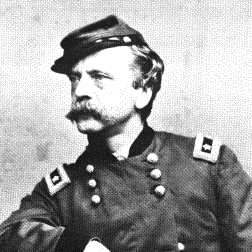 Daniel Sickles (1819-1914) was a New York congressman and controversial Union general during the American Civil War (1861-65).
Daniel Sickles (1819-1914) was a New York congressman and controversial Union general during the American Civil War (1861-65).
On Feb. 27, 1859, Sickles shot and killed Philip Barton Key, who was the son of Francis Scott Key. Sickles claimed temporary insanity (the first time that defense was used in the United States) arising from what he believed were Key’s amorous intentions toward his wife. Sickles was acquitted.
A political appointee, and not a military general, Sickles’ combat career ended after his disastrous performance at the Battle of Gettysburg, during which he disobeyed the orders of his commanding officer, Union Maj. George Meade. Sickles insubordination led to the near destruction of his corps and a severe wound that required the amputation of his right leg.
After the war, Sickles served as a U.S. diplomat, congressman and federal official overseeing Reconstruction.
Source: History
